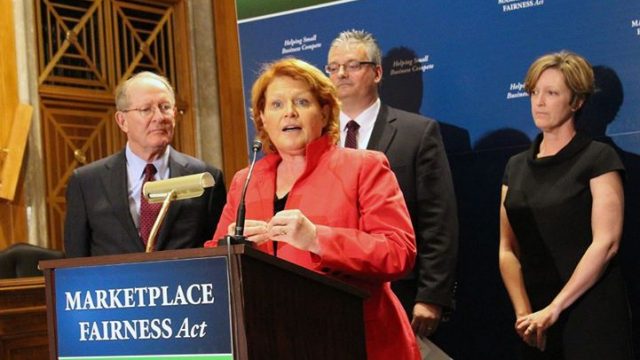Schafer Column: There's No Need For The Marketplace Fairness Act

Online shoppers last year spent an estimated $225 billion in retail. While that number is significant in this economy, it only represents about six percent of all retail transactions. Nearly 95 percent of consumers still prefer to see, feel and touch what they are buying.
Nevertheless, the growth in online sales has been impressive enough that it has received the attention of traditional ‘brick and mortar’ retailers as well as cash-strapped state and local governments. This powerful array of interests united in Washington behind the so-called “Marketplace Fairness Act.”
The “Marketplace Fairness Act” establishes a national sales tax collection mandate on Internet sellers. With state and local governments desperate for new sources of revenue, it is easier to turn to Washington to raise taxes rather than managing their own budgets properly. Local retailers have said they simply want to “level the playing field,” but consider this: traditional retailers today have to collect and pay sales taxes in the states where they are physically located as do the online retailers. With the proposed ‘fairness’ tax increase, online retailers will have to collect and pay sales taxes in every jurisdiction where they have a customer.
Today, if you purchase an item in one state that doesn’t impose a sales tax, your cost is less than in another state that does collect a sales tax. But now politicians want to force you to pay sales tax on everything you purchase online. There is nothing ‘fair’ about that.
Because more than 85 percent of online sales are dominated by big-box retail, most of the anticipated revenue for states and localities is an illusion.
In places like New York and California where this tax collection has already gone into effect, estimates of new tax revenue proved to be exaggerated by 75 to 80 percent. Perhaps this is because most of Internet sales are already taxed.
For anyone who hasn’t been paying attention, the hard lesson of this economy is that increasing the size and scope of government doesn’t work to stimulate the economy. Raising more government revenue through a new tax and subsequent collection costs on small businesses will not put us on the path to economic growth that everyone in Washington claims to be their priority.
As bad as new taxes are for a floundering economy, however, the unintended consequences are the biggest looming tragedy. In my home state of North Dakota, many rural farmers and ranchers have to drive 50 or 60 miles or more to a small rural town only to find limited retail options and a reduced selection of goods and services.
Sixty million people live in rural America and Internet shopping has helped this hardworking and yet easily ignored segment of our nation have access to the same goods and services that are easily reached by urban communities. And what they save in the way of taxes is pretty well offset by the added costs of shipping and handling, making the current market already plenty ‘fair.’
Another easily forgotten segment of our society this looming tax increase dressed up as ‘fairness’ is anything but fair to is the home-bound and those who lack the transportation options others take for granted.
The “Marketplace Fairness Act” is actually unfair for consumers and the small to medium-sized businesses that create most of the jobs and economic growth in our country. The consequence of this legislation will only be to accelerate the trend toward market dominance by the very biggest of retailers at the expense of both consumer choice and, ultimately, good old-fashioned market competition. And for taxing jurisdictions that believe they are going to somehow harvest a big tax windfall and build into their budgets increased spending, their only option when the projected revenue doesn’t appear will be to raise other taxes to make up the difference.
The U.S. House of Representatives has a chance to stop this ill-conceived and misunderstood legislation. Please contact your local member of Congress and tell them to really be ‘fair’ to you and vote against this legislation.







